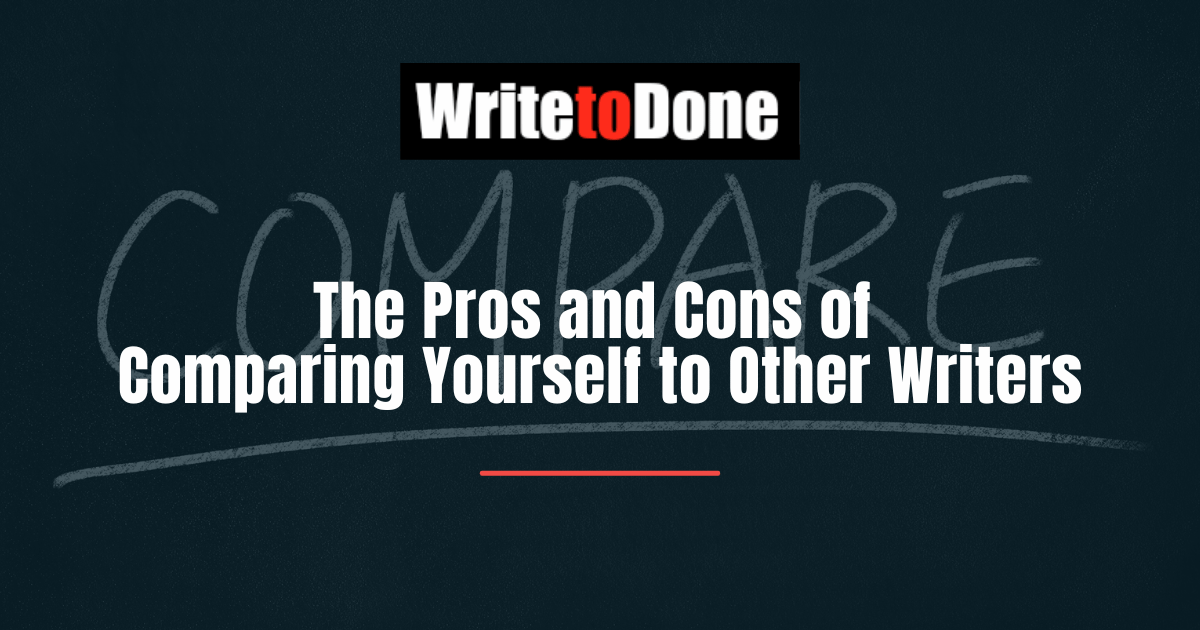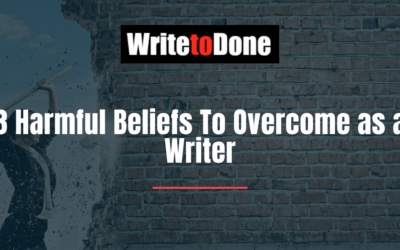With the advent of writing communities on such networking sites as Twitter and Facebook and half a thousand forums and Nings, writers are perhaps more social and less solitary than at any time in our history.
This brings its fair share of both benefits and drawbacks, since our easy access to other writers—both those who are striving to be published and those who have a dozen bestsellers under their belts—causes inevitable comparisons.
Are we as good as they are?
Are they as good as we are?
Let’s explore what we can gain from answering these questions, as well as the pitfalls to avoid.
Cons
Jealousy: Easily, the most destructive con of comparison is that of jealousy. Sometimes this jealousy is the simple result of having read a book that spun its tale with such gossamer characters and seamless themes that we were left astonished.
We look at this brilliant author’s perfect prose, and we hate them just because they’re so much better than us. Or perhaps a writing buddy has just nailed a plum contract with the Agent of the Year. What did she do to deserve that honor, especially when—let’s be honest here—her writing leaves a lot to be desired compared to ours?
Jealousy is a flaw common to the vast majority of writers (due largely to the next con on our list), but it’s one that gets us exactly nowhere. The sooner we can stand up to our feelings of jealousy, put them behind us, and work toward being genuinely happy for our fellow writers, the more content and the more productive we’ll be.
Because, let’s face it, there’s always someone who’s better, richer, or luckier than we are. Jealousy is a never-ending melodrama of pain and pettiness.
Inferiority: Perhaps the reason jealousy is so prevalent among authors is that it almost always follows on the heels of its kissing cousin: inferiority. Very few writers are able to maintain perfect confidence in their skill.
When we run across a writer whose prose is more effortless than ours, whose characters are more realistic, whose paychecks are larger, and whose accolades are louder, we can’t help but compare. And when we find ourselves wanting, we either want to plot laborious and exhaustive murder for the object of our comparison, or we want to crumple in a corner and bawl at our general wretchedness. Sometimes both.
In one sense, this chronic inferiority complex is actually a positive thing, since it keeps us honest. As Orson Scott Card put it in How to Write Science Fiction and Fantasy, “Writers have to simultaneously believe the following two things: The story I am now working on is the greatest work of genius ever written in English. The story I am now working on is worthless drivel.”
Maintaining humility in our work is crucial to our genuineness as artists. But we can’t take this too far. We have to be able to reach a place of objectivity from which we can honestly compare our work to other writers, glean what we can from that comparison, or, if there’s simply nothing to be gained (as would be the case if we, say, compared the latest advance on our books to Stephen King’s), shrug it off as the inconsequentiality it is.
Pros
Inspiration: Comparing ourselves to other writers isn’t all bad. So long as we keep the downfalls in mind and are prepared to avoid them, we can actually gain a number of benefits from considering our fellow writers and how we measure up against them.
Honestly, can you imagine living entirely segregated from writerkind?
That would mean no books to read.
No fellow crazies to understand our quirks and obsessions.
No writerly energy to feed off.
We gain our inspiration from the art of others, from hearing about our writing buddies’ struggles, and from bouncing ideas back and forth.
If I were to write a thank you note to every author I’ve read, loved, and inevitably compared myself too, I probably wouldn’t have time to finish my next novel. Because most of us write the kind of books we enjoy reading, we are constantly reading books that are similar to our own. We recognize similar elements, compare them, and learn how to improve our own characters, plot, and prose as a result.
It’s a win-win situation, because who’s to say our mentors may not someday read one of our stories and find some similarity that brings that next epiphany to their writing?
Motivation: Once we get over the crumpling and crying brought on by our sense of inferiority in comparing ourselves to great writers, our next step is to rise from the ashes, pen in hand, motivated to blot out the very reason for our inferiority. The brilliance of this other author isn’t a boulder to crush us; it’s a mountain to scale.
Perhaps today we’re not good enough to be mentioned in the same breath with our heroes, but, you know what? If they can do it, so can we!
Reading great writers and comparing their brilliant stories to my own has been one of the single greatest factors in motivating me to keep writing, keep learning, keep trying. Nothing is more exciting to the dedicated writer than reading good fiction. Good stories excite us and drive us forward. We close the covers on a good book, and the first thing we want to do (after buying the sequel) is run to our keyboards and funnel all that inspiration and motivation into our own writing.
As with so many things in the writing life, successfully comparing ourselves to other writers is all about balance. If we can tamp a lid on the cons and embrace the pros, we can use the success of our fellows to launch ourselves to even greater heights.
It should be the goal of every writer to be comparison worthy. Hearing someone say, “I wish I could write as well you,” isn’t only the highest of compliments, it’s also a sign you’re giving back to the writing community the benefits you drew from it yourself.
About the Author: K.M. Weiland is the author of the historical western A Man Called Outlaw and the medieval epic Behold the Dawn. She enjoys mentoring other authors through her writing tips, her book Outlining Your Novel: Map Your Way to Success, and her instructional CD Conquering Writer’s Block and Summoning Inspiration.
___________________________________________________________________________________________________

















